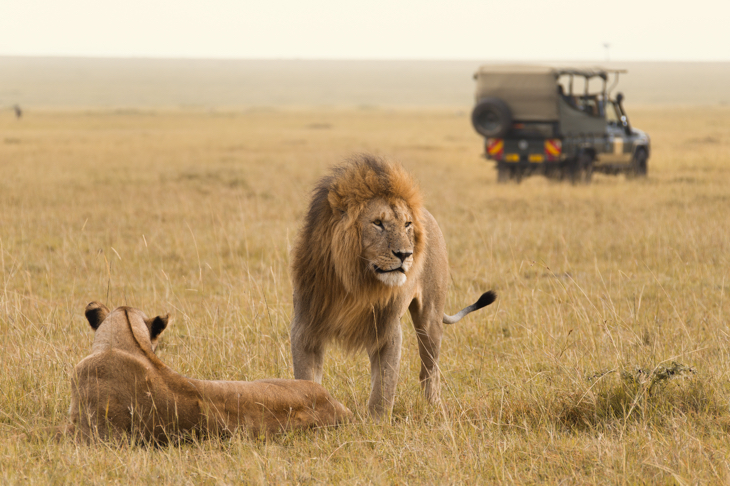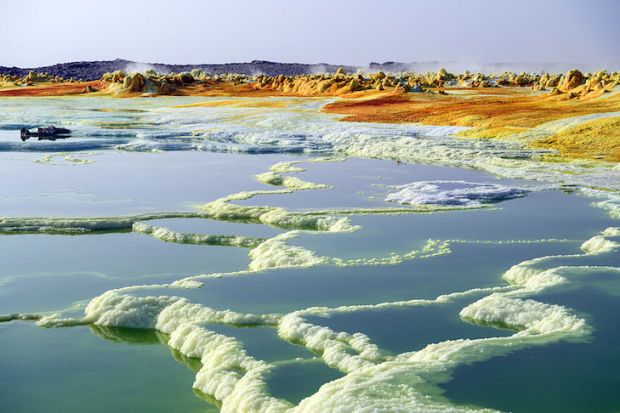When were you last in a game reserve? Perhaps most Spectator readers will be familiar with the experience and if you’re anything like me it’s a happy one. Where would I rather be than in an open-topped Land Rover as the sun rises over the African bush, wandering on wheels through the savannah, pausing unhurried to look around: switching off the engine, listening, watching, drinking it all in?
But do I care if I spot a hyena to tick off on my list? Do I seriously fret about whether that graceful creature is an oryx or an eland, whether that glittering and iridescent bird is a greater blue-eared starling or a red-tufted malachite, or whether this giraffe we’ve just startled is reticulated or Rothschild’s? Do I mind much if, in the end, that log turns out to be a log, or a croc? Here’s a small confession: I do not.
I’ve just spent ten wonderful days in East Africa. We started by climbing Mt Kenya; afterwards we visited the beautiful Elephant Watch Camp in the Samburu National Reserve in northern Kenya. Each half of our safari had a distinct and designated purpose. The first was to reach a mountain peak. The second was to see game.
In the first case the stated motive was the real one. I really did want to reach Point Lenana: to stand there, look out over the plains, savour the satisfaction of having walked and scrambled all the way up to this 16,355ft castle of rock and then descend again, all under my own steam.
But in the second case I fear that a small confession applies. I can take or leave the species-spotting. Really, I just wanted to be in a wonderful place. Born and raised in Africa, I must have enjoyed a hundred game drives, and never tire of them. This Samburo reserve was new to me and is among the best I’ve visited. The tented camp was an elegant wedding of human construction and natural setting; and I have to confess I’ve reached an age when a bit of discreet luxury pleases.
But you need an excuse, don’t you? I do. For me the Save the Elephant campaign was not an excuse and I hope to write more about this later. But the game drives? I wouldn’t have missed them for anything, but I wouldn’t have missed the animals all that much, either. Cows would be fascinating too if we decided to be intrigued by their habits and anxious for close-up observation; nipping into our nearest village in Derbyshire for a bag of sugar could be combined with a game drive.
No, to awake beneath mosquito nets to the morning chorus of African birds, while perfectly careless which birds they are; to return to camp where a bush shower and a stiff whisky soda await; to sit by the fire beneath the bright stars, chatting, sipping, hearing a distant rumble and not much minding if it’s a lion roaring or an elephant farting… to sense a shaking in the acacias above and smile, indifferent to whether it’s a baboon or a monkey… such are the pleasures that draw me to the savannah.
How much of our lives, I wonder, consists in pursuing nominal aims with the unstated motivation of satisfying a different desire? While writing this I’ve brewed myself five cups of tea. Though the initial sip is nice, most of the cups are only half drunk and now litter my desk. I’m not addicted to tea or coffee and can manage perfectly well without either; but the thought — as, perhaps, I end this paragraph — ‘ah, time for a nice cup of tea’, brings a small but discernible inner smile.
We dine out with friends or business colleagues. ‘Let’s do lunch,’ we say. But is it the lunch? Often I can hardly remember what I ate, but we took an hour or more over it, though the food could have been more efficiently ingested in seven minutes. It’s just that meeting another and sitting with them at a table for an hour, without food to toy with, would feel somehow forced.
We tell ourselves we like going to the pub, that we like the institution of pubs, and that the conversation, the human warmth and the laughter, are ends in themselves, and the main reason we go. But try giving up alcohol for a few months, and observe as a matter of fact how often you feel drawn to nip out to the pub for an orange juice, and I’d challenge you to deny that the missing ingredient must be the alcohol.
We make a to-do of sniffing wine with thoughtful expressions, and quaff it while assuring each other and ourselves that wine appreciation is all about savouring the complex bunch of tastes and bouquets that a fine wine delivers to palate and nostril. But suppose — just suppose (never mind whether it could be chemically possible, please God not) — that a totally non-alcoholic wine could be invented that possessed all the appeal to the senses that the alcoholic varieties offer. Do you honestly believe that connoisseurs and ordinary wine-drinkers alike would embrace the product?
Fishing, I suppose, is the most obvious example. Most anglers will merrily confess that what (or whether) they catch is rather secondary. The pleasure, however, of communing utterly unhurriedly with nature — the pleasure of prolonged blankness in a pleasant setting — gets them to the riverbank; and perhaps it is sometimes augmented by some small relief in getting away from wherever, whatever or whomever it is they are escaping.
And then there’s love. ‘I will not go to Finsbury Park,’ writes Betjeman, of a break-up…
‘The putting course to see
Nor cross the crowded High Road
To Williamsons’ to tea,
For these and all the other things
Were part of you and me.’
I’m not in favour of honesty here; not in favour of stripping away the stated reasons and laying bare the unstated ones; not in favour of analysing into dust our pleasures and our leisures. I simply observe how odd we all are — how very, very odd.
Got something to add? Join the discussion and comment below.
Get 10 issues for just $10
Subscribe to The Spectator Australia today for the next 10 magazine issues, plus full online access, for just $10.
You might disagree with half of it, but you’ll enjoy reading all of it. Try your first month for free, then just $2 a week for the remainder of your first year.















Comments
Don't miss out
Join the conversation with other Spectator Australia readers. Subscribe to leave a comment.
SUBSCRIBEAlready a subscriber? Log in